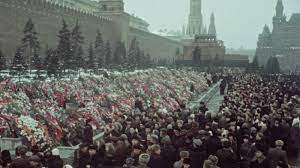Eye For Film >> Movies >> State Funeral (2019) Film Review
State Funeral
Reviewed by: Matthew Anderson

The death of Stalin is no laughing matter in Sergei Loznitsa’s monumental State Funeral. Like the thousands who queue for hours, yearning to see their dearly departed leader lying in state after his demise in early March 1953, the Ukrainian director’s epic 2019 documentary is slow, solemn and icy cold. What the cumulative effect of masterfully restored newsreel may lack in action, it more than makes up for with the numbing, slow-burn sensation of being drawn under the spell of state-orchestrated mass mourning, of submitting to the propaganda of a different continent, nearly 70 years on.
It is a remarkable, unsettling achievement. A demanding watch, even for the keenest of cinephiles or students of the Communist era, State Funeral strikes a fine balance between objective historical distance and the immediacy of experiencing a momentous national event first-hand. It plays out in front of our eyes; we bear witness to what occurs at the same time as the people of Moscow or Vladivostok, Riga or Tallinn. The dawning realisation of this elasticity, a kind of warping of time, is almost imperceptible; however, through his skilled sequencing of footage, as well as varying the distance from which we observe what is a sincerely bizarre spectacle, Loznitsa prompts a re-evaluation of this landmark ceremony and the contemporary reaction to it.

Alternately given front-row seats among the mourners or positioned to look down from upon high above Red Square, contemplating the much bigger picture, the reactions of individual faces blur with crowds as far as the eye can see; a solitary worker, the smallest of cogs in a gargantuan machine, is overwhelmed by the millions that constitute the Soviet peoples; one woman’s tearful capturing of a memory, an ‘I was there’ moment, as she passes Stalin’s coffin, is consumed by the enormous weight, and reckoning, of history. In no greater way is this interrelation, and to some degree conflict, between past and present more skilfully portrayed than by the regular changes from black and white to colour footage, and back again.
The former, easily relegated to the past, is a relic of times gone by, but the latter, made of bright splashes of red and green wreaths, dull, brutalist greys and a sullen wintry sky, feels far more immediate. Eschewing any direct comment or interrogation, Loznitsa allows the more than two hours of archival footage from the days around Stalin’s death to speak largely for itself, but maintains a firm handle on our perception of this significant turning point in Soviet history through the film’s soporific pacing, repetition, and patient, exemplary editing.
With the benefit of hindsight and all that is now known of Josef Stalin’s tyranny, a maniacal leadership that would be swiftly condemned by the following Committee in 1956 as ‘a cult of personality', it is all too easy to look upon the beleaguered, tearful faces and downcast expressions in disbelief. But how many times would you need to hear a man deified, considered the beating heart of a nation, or described upon his death as “the greatest genius in the history of mankind”, before you might begin to drink the proverbial Kool Aid? When, out of fear or genuine belief, would you cease to question the obvious propaganda? Scripted responses heard once, twice, three times, right across the USSR, are clearly misleading, but say it long enough and loud enough, and lies become truth.
It is a chilling concept. Lulled into a similar position, albeit only for two hours and 15 minutes, a viewer nonetheless comes away from State Funeral with the understanding that history does not exist in the past, and – as the old cliché goes – that it does have a tendency to repeat itself. Dogged determination is needed here, then, though there is much to be learned. A tyrant, responsible for the deaths of millions of his own citizens, succeeded in pulling the wool over the eyes of many, who then stood shivering, inadequately clothed, to pay their respects. “Stalin’s immortality is in his deeds,” says one adulatory radio broadcast announcement. Quite, and let that be a lesson to you.
Reviewed on: 07 May 2021


















